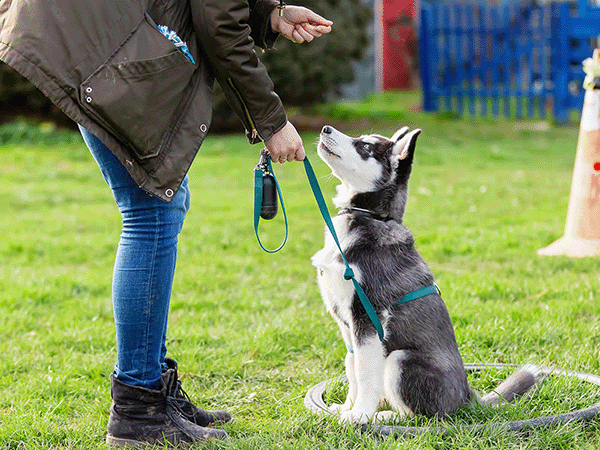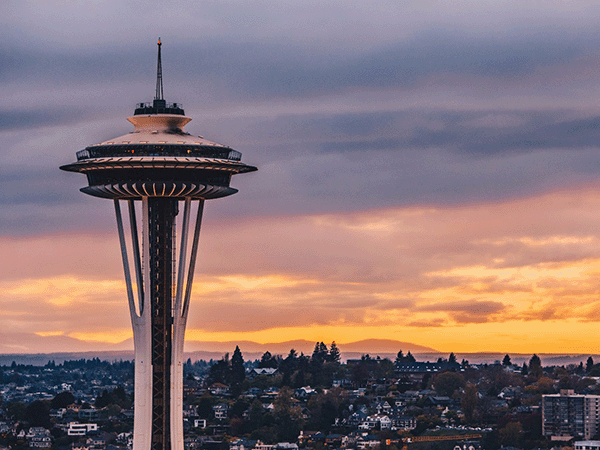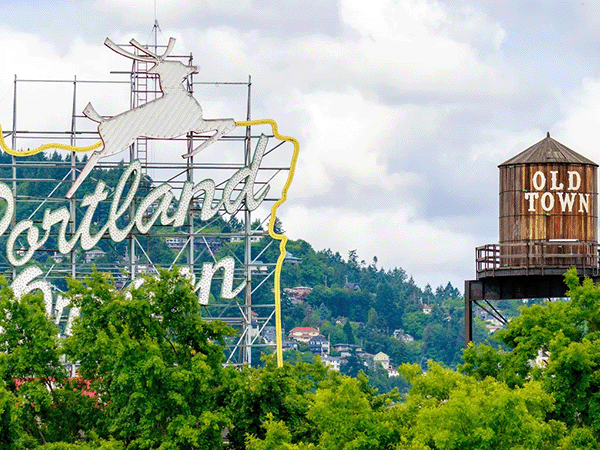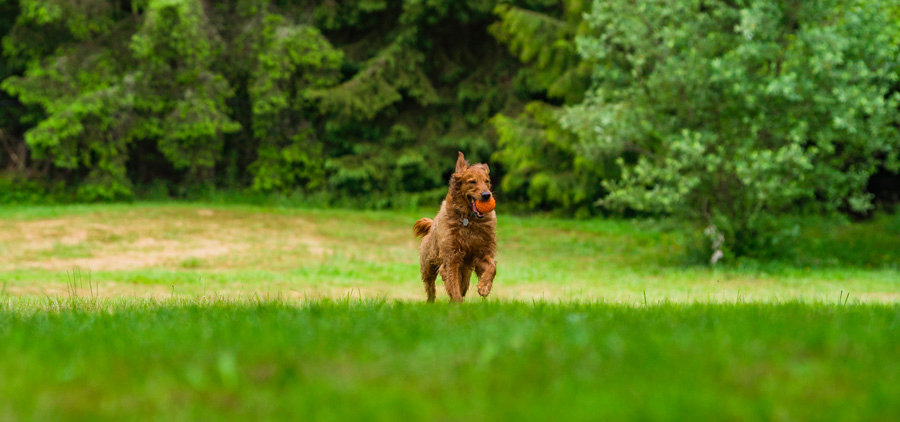9 Best Online Communities for Reactive Dog Parents

Does your dog's reactivity make walks stressful? You're not alone. Many dog owners face similar challenges. This guide offers practical advice and support for managing reactivity, including finding the best online dog training for reactive dogs. We'll connect you with reactive dog support groups, share training tips, and explore resources like the best dog training app for reactive dogs. Let's build a stronger bond with your dog, together.
* All Sniffspot articles are reviewed by certified trainers for quality, please see bottom of article for details *
Call it growly, fearful, selective, aggressive, unfriendly or reactive — according to our proprietary research into behavioral problems in dogs, it turns out 75% of pet owners have a pup that in some way overreacts to stimuli with reactive behaviors. It’s hard to be a dog in the modern world. More and more of us are living in cities with our dogs and cities weren’t built for dogs. The loud noises, fast moving objects, dangerous roads and leashes – this isn’t an environment that is conducive for a dog to live their best life. And thus we are seeing dogs develop more and more neuroses.
Being a reactive dog parent can be lonely and discouraging. You are watching a loved one suffer and might be unsure how to help them. You may feel anxiety about everyday activities, like taking your dog for a walk — who knew that could be so stressful? You may feel a stigma, like something is wrong with your dog or with you… and that might tempt you to keep your dog’s reactivity a secret.
But you are not alone! Like we mentioned above, 75% of dog owners have a dog that in some way shows reactive behaviors. Many of these pups struggle due to underlying medical issues, common training mistakes, and more reasons — things that can often be addressed to help you and your companion live a better life together.
In the meantime, as you look into reactive dog training, check out these online communities for ideas, support, training resources, and — most importantly, because you need to take care of yourself, too — just to have human connection with other pet owners going through the same thing. Your dog can have a full life!
As always, we recommend taking any kind of behavioral course in partnership with a certified trainer whose repository of training knowledge is based in science and full of compassion. They can guide you through simple things like leash training, more complicated topics like extra training tools you might add to your outings (humane options, like backup collars for added security, for example), and ultimately provide reactive dog guardians like yourself with helpful protocols for you and your pup to make progress.
1. Reactive and Aggressive Dog Support Group (Facebook)

Run by Eden Dog Academy, this Facebook group is dedicated to supporting people living with dogs with behaviour problems such as reactivity and aggression. At tens of thousands of members, there is much honest discussion with people frequently asking questions and getting support for their reactive dogs. They follow LIMA (Least Intrusive Minimally Aversive) reactive dog training guidelines.
2. Fearful and Reactive Dog Support Community by Dogkind (Facebook)

Join more than 15 thousand other reactive dog parents in supporting each other in this Facebook group for pet owners run by Dog Kind training. This group is dedicated to positive reinforcement training and does not allow discussion of aversives, though they do welcome dedicated guardians to ask tough questions and share challenging experiences.
3. r/reactivedogs (Reddit)

With nearly 75,000 members, this subreddit is devoted to reactive dog training questions, answers, and general advice between non-judgmental people living with reactive dogs. They support the LIMA (Least Intrusive, Minimally Aversive) approach to dog training.
Check it out here
4. Reactive Dog Owners of Minnesota (Facebook)

If you live in Minnesota and have a reactive dog, check out this Facebook group for reactive dog owners in Minnesota. This group is not a Sniffspot group, but we do sponsor it! It only allows science-based, positive training discussion.
5. Reactive / Difficult Dog Owners of Washington (Facebook)

If you are located in Washington state, check out the local reactive dog Facebook group. You can find others in the area going through the same thing as you, connect with folks planning pack walks or connect with a local trainer. This group was started by Sniffspot’s founder and is for science-based, positive training only.
6. Reactive Dog Owners of Oregon (Facebook)

This is a local reactive dog support Facebook group for folks living in Oregon. If you live in Oregon, join to connect with other local reactive dog parents. This group was started by Sniffspot’s founder and is for science-based, positive training only.
7. Reactive Dog Owners Of California (Facebook)

This local Facebook group is for California reactive dog parents. This group was started by Sniffspot’s founder and is for science-based, positive training only.
8. Reactive Dog Owners of DC, Maryland, & Virginia (Facebook)

If you live in the DMV (DC, Maryland, Virginia) area and have a reactive dog, consider joining this Facebook group to connect with other locals going through the same thing. This group was started by Sniffspot’s founder and is for science-based, positive training only.
9. Reactive Dog Owners of Massachusetts (Facebook)

This is a local reactive dog owner group for folks in Massachusetts. You can get support and advice, such as the best trainers or sitters for reactive dogs, etc. Sniffspot also sponsors this group, but it is not a Sniffspot group. It only allows positive training techniques.
Key Takeaways
- Dog reactivity is surprisingly common: Many dog owners report some level of reactivity in their dogs. Connecting with support groups, both online and locally, can offer a wealth of information and emotional support.
- Positive reinforcement training methods are crucial: Look for training programs that prioritize positive reinforcement and avoid punishment-based techniques. Work with a certified trainer to create a personalized plan for your dog.
- Sniffspot provides specialized resources: Sniffspot's private dog parks offer safe, controlled environments for reactive dogs. Combine this with their online resources and articles on dog reactivity for a well-rounded approach to supporting your pup.
Understanding Dog Reactivity
What is Reactivity?
Dog reactivity describes exaggerated responses to certain stimuli. These responses often manifest as barking, lunging, growling, or other excessive behaviors. It's important to understand that reactivity isn't necessarily aggression, but rather an overreaction rooted in fear, anxiety, or frustration. A reactive dog isn't trying to be "bad," they're simply struggling to cope with their environment. As mentioned earlier, a surprising 75% of dog owners report some level of reactivity in their dogs, so you're definitely not alone if your pup struggles with this.
Common Triggers
Reactive dogs can be triggered by a wide variety of stimuli. Common triggers include other dogs, strangers, loud noises, sudden movements, or even specific objects. City life, with its constant hustle and bustle, can be particularly challenging for reactive dogs. The constant barrage of sights, sounds, and smells can be overwhelming for a sensitive pup. Even seemingly benign things like skateboards, bicycles, or children playing can trigger a reactive response. Identifying your dog's specific triggers is a crucial first step in managing their reactivity.
Why Dogs React
There are many reasons why a dog might develop reactive behaviors. Genetics can play a role, as some breeds are naturally more predisposed to anxiety or fear. Early socialization experiences are also critical. Puppies who haven't been exposed to a variety of people, places, and situations may be more likely to react negatively to new experiences later in life. Underlying medical conditions can also contribute to reactivity, so it's always a good idea to rule out any physical causes with your veterinarian. Past trauma or negative experiences can also make a dog more reactive. More information on why dogs react can be helpful as you start this journey.
Choosing the Right Training Program
Factors to Consider
Finding the right training program for a reactive dog is essential for success. Look for programs that emphasize positive reinforcement methods and avoid punishment-based techniques. A good trainer will focus on building a positive relationship between you and your dog, while also addressing the underlying causes of reactivity. It's also important to consider your dog's individual personality and needs. Some dogs may do well in group classes, while others may benefit from one-on-one training. Check out our list of top dog trainers for some great resources.
In-Person vs. Online Training
Both in-person and online training can be effective for reactive dogs. In-person training offers the benefit of direct interaction with a trainer and the opportunity to socialize your dog in a controlled environment. Online training provides more flexibility and can be a good option for people who don't have access to qualified trainers in their area. Many online programs offer personalized support and guidance, allowing you to tailor the training to your dog's specific needs. Ultimately, the best choice depends on your individual circumstances and preferences.
Training Philosophies (BAT, Positive Reinforcement, etc.)
Different training programs utilize different philosophies. Behavior Adjustment Training (BAT) focuses on teaching dogs alternative behaviors in response to triggers. Positive reinforcement methods, as the name suggests, reward desired behaviors and avoid punishment. It's important to research different training philosophies and choose one that aligns with your values and your dog's temperament. Avoid programs that rely on aversive methods, as these can worsen reactivity and damage your relationship with your dog. A certified professional dog trainer can help you determine the best approach.
Top Online Training Programs for Reactive Dogs
Program 1 (Name and brief description)
This section would include specific online training programs, but I don't have access to that information to provide accurate recommendations. I recommend researching reputable online dog training programs specializing in reactivity. Look for trainers certified in CPDT-KA or IAABC.
Pricing
(Pricing information would go here)
Program 2 (Name and brief description)
(Program information would go here)
Pricing
(Pricing information would go here)
Program N (Name and brief description)
(Program information would go here)
Pricing
(Pricing information would go here)
Training Tips and Techniques
Positive Reinforcement
Positive reinforcement is a cornerstone of effective training for reactive dogs. Rewarding desired behaviors with treats, praise, or toys helps your dog understand what you want them to do. Keep training sessions short and positive, and focus on building a strong bond with your dog.
Counter-Conditioning
Counter-conditioning involves changing your dog's emotional response to a trigger. If your dog reacts fearfully to other dogs, for example, you might pair the sight of another dog with something positive, like a high-value treat. Over time, your dog will begin to associate the trigger with something pleasant, reducing their fear and reactivity. The American Kennel Club offers some helpful advice on counter-conditioning.
Desensitization
Desensitization involves gradually exposing your dog to their triggers at a low intensity. Start by exposing your dog to the trigger at a distance where they don't react. Gradually decrease the distance as your dog becomes more comfortable. The goal is to help your dog learn to tolerate the trigger without overreacting. This process should always be done under the guidance of a qualified professional.
Body Language Recognition
Learning to read your dog's body language is essential for managing reactivity. Recognizing subtle signs of stress or anxiety, such as lip licking, yawning, or whale eye, can help you intervene before your dog reaches their breaking point. By understanding your dog's communication signals, you can better anticipate and manage their reactions. Several resources are available to help you learn more about canine body language.
Finding Support and Resources
Online Communities and Forums
Connecting with other reactive dog owners can provide invaluable support and advice. Online communities and forums offer a safe space to share experiences, ask questions, and learn from others who understand the challenges of living with a reactive dog. These communities can also be a great source of information on training techniques, resources, and local support groups. Be sure to look for groups that focus on positive reinforcement methods.
Local Support Groups
Local support groups offer the opportunity to connect with other reactive dog owners in your area. These groups often organize group walks, training sessions, and other activities in safe, controlled environments. Connecting with local resources can help reduce the isolation that many reactive dog owners feel and provide a sense of community. Check with local dog trainers or your veterinarian for recommendations.
Sniffspot Resources for Reactive Dog Owners
Sniffspot offers a variety of resources for reactive dog owners, including private dog parks that provide a safe and controlled environment for reactive dogs to play and socialize. These parks can be a great alternative to public dog parks, which can be overwhelming for reactive dogs. Check out our articles on dog reactivity for more information and support. Remember, with the right support and resources, your reactive dog can live a full and happy life!
Expert Trainer Insights
There is so much misinformation out there, we want to make sure we only provide the highest quality information to our community. We have all of our articles reviewed by qualified, positive-only trainers.
This is the trainer that reviewed this article:
Lindy Langum
Founder – K9 Fun Club
Staff Trainer – Summit Assistance Dogs
Certified in Canine Studies (CSS), NW School of Canine Studies
Sniffspot's Survey Data
Sniffspot Research 2023, n = 4,092

Related Articles
Frequently Asked Questions
Is my dog’s reactivity my fault? It's common to feel responsible for your dog's reactivity, but it's rarely solely the owner's fault. Reactivity stems from a combination of genetics, early experiences, environment, and sometimes underlying medical conditions. Focus on understanding your dog's triggers and seeking professional guidance to help them manage their reactions. There are many things you can do to help your reactive dog.
What's the difference between reactivity and aggression? Reactivity is an overreaction to a trigger, often based on fear, anxiety, or frustration. Aggression, while sometimes triggered by similar stimuli, is typically a more deliberate behavior intended to cause harm or maintain control. A reactive dog may bark, lunge, or growl, but not necessarily bite, while an aggressive dog is more likely to exhibit biting or attacking behaviors. It's important to consult with a certified trainer or behaviorist to accurately assess your dog's behavior.
How can I find a qualified trainer for my reactive dog? Look for trainers who emphasize positive reinforcement methods and have experience working with reactive dogs. Certifications like CPDT-KA or IAABC demonstrate a commitment to science-based training practices. Ask potential trainers about their approach to reactivity and ensure it aligns with your values. Personal recommendations from other reactive dog owners or your veterinarian can also be helpful.
Are private dog parks a good option for reactive dogs? Private dog parks, like those offered by Sniffspot, can be an excellent resource for reactive dogs. They provide a controlled environment with fewer distractions and less unpredictability than public dog parks. This allows reactive dogs to enjoy off-leash time without the stress of encountering unknown dogs or triggers. You can even find private parks specifically designed with reactive dogs in mind.
What if I can't afford professional training? While professional training is ideal, there are still steps you can take to help your reactive dog. Many online resources offer guidance on managing reactivity, including articles, videos, and forums. Joining online support groups can connect you with other reactive dog owners who can offer advice and support. Remember, consistency and patience are key, and even small steps can make a big difference.
Most recent articles
Related articles
Top dog guides per area
Dog training guides

Dog Food Aggression: Why You Shouldn't Punish It
Does your dog ever growl when you walk by their food dish? Maybe they get possessive of treats, carrying them far away and giving you side-eye when you start to approach — or snarling at your other pets or children if they get too close.

Best Dog Fields in the US: 25+ Wide-Open Spaces for Your Pup to Run Free
The best dog fields in the US offer something that traditional enclosed parks simply can't match: acres of open space where your pup can truly stretch their legs and run at full speed. From Colorado's 470-acre prairie meadows to Tennessee's award-winning "Outback," these wide-open spaces allow dogs to roam, explore, and exercise naturally while engaging instincts that cramped urban parks suppress.

The Ultimate Guide to Scent Training for Dogs
Your dog's nose is an amazing tool. Did you know they have 40 times the olfactory receptors than humans? Scent training for dogs taps into this superpower, turning everyday moments into exciting sniff-fests. It's enriching for all types of dogs – reactive, shy, or simply adventurous. Ready to explore the world of scent work for dogs? Let's get started.

Service Dog Training Costs: DIY vs. Pro
More than 80 million Americans rely on their service dogs to help them navigate the world. Task-trained assistance animals perform a huge range of life-changing—in many cases, life-saving—services: These dogs act as eyes for visually impaired handlers, provide mobility support, alert to seizures and blood sugar crashes, interrupt anxiety attacks, remind their people to take medications, and so much more.

How to Deal With Puppy Potty Training Regression
You thought those dreaded middle-of-the-night potty breaks were over. You were finally free from cleaning up puppy puddles. Then, suddenly, your furry friend starts having accidents again. It's frustrating, right? This puppy potty training regression is more common than you think. Don't worry; we'll help you get your pup back on track. We'll cover the common causes, offer practical solutions, and give you actionable steps to tackle this challenge together.

Dirty Dog Syndrome: Causes, Solutions, and Prevention
It's a cringe-worthy moment every dog owner dreads: your furry friend chowing down on something truly disgusting. If your dog has a penchant for poop, you're dealing with coprophagia. It's more common than you think, and thankfully, often manageable. This article explores the reasons behind dirty dog syndrome, from instinct to learned behavior. We'll also give you practical tips to help break this unpleasant habit.

How to Train Your Rescue Dog: A Complete Guide
* All Sniffspot articles are reviewed by certified trainers for quality, please see bottom of article for details *
Dog enrichment guides

Best Dog Water Parks in the US: 15+ Amazing Splash Destinations for Your Pup
Do you have a water-loving dog looking to burn some energy? There are countless dog parks to visit throughout our country — but some of them become far too hot in the midday sun to be safe for your pets to play. That’s why we’ve put together a list of some of the best dog water parks throughout the United States! At these locations, your pup can frolic, splash, and swim to their heart’s content.

Best Dog Fields in the US: 25+ Wide-Open Spaces for Your Pup to Run Free
The best dog fields in the US offer something that traditional enclosed parks simply can't match: acres of open space where your pup can truly stretch their legs and run at full speed. From Colorado's 470-acre prairie meadows to Tennessee's award-winning "Outback," these wide-open spaces allow dogs to roam, explore, and exercise naturally while engaging instincts that cramped urban parks suppress.

Best Toys for Herding Dogs: Keeping Your Pup Happy & Engaged
Herding dogs are amazing, intelligent companions. But that also means they need more than just a simple game of fetch. Finding the right toys for herding dogs is key to keeping them happy and stimulated. This article explores some of the best toys for herding dogs, including options specifically for breeds like Border Collies and Australian Shepherds. We'll help you discover the perfect herding toys for dogs to tap into their natural instincts and keep them entertained for hours.

Tough Dog Toys for Aggressive Chewers: A Practical Guide
Does your dog destroy every toy you give them? Is your house littered with the remnants of plush toys? Are you tired of wasting money on "indestructible" dog toys for aggressive chewers that don't last? Then this post is for you. We'll cover everything you need to know about finding the best dog toys for aggressive chewers, so you can finally give your pup something safe, durable, and fun.

Daily Exercise Calculator: How Much Exercise Does Your Dog Need?
Everyone knows dogs need exercise, but how much is enough? Walks are great, but creating a truly balanced fitness plan means understanding your dog's specific needs. This post helps you develop a daily exercise calculator for your dog, considering breed, age, and lifestyle. We'll cover fun activities, understanding exercise intensity, and recognizing when your pup has had enough. Let's create a plan that keeps your dog happy and healthy!

Complete Guide To Herding With Dogs
* All Sniffspot articles are reviewed by certified trainers for quality, please see bottom of article for details *

Dog Enrichment Activities: The Ultimate Guide
Ever feel like your dog is restless or bored? They may be getting enough exercise, but still need more. That's where enrichment activities for dogs come in. Giving your dog opportunities to sniff, explore, and problem-solve can make a world of difference. Whether you have a puppy, adult, or senior dog, enriching their environment is key for their well-being. Let's explore how to add cognitive enrichment for dogs, even tailoring activities to your dog's breed with breed specific enrichment and fun enrichment games for dogs.
Dog reactivity guides

Rottweiler Aggression: Truth vs. Myth
Many dogs have gotten a bad reputation over the years for being "dangerous breeds." Rottweilers are among them. Like pit bulls and other large, blocky-headed types of dogs, these powerful and beautiful animals are often assumed to be aggressive.

Best Dog Fields in the US: 25+ Wide-Open Spaces for Your Pup to Run Free
The best dog fields in the US offer something that traditional enclosed parks simply can't match: acres of open space where your pup can truly stretch their legs and run at full speed. From Colorado's 470-acre prairie meadows to Tennessee's award-winning "Outback," these wide-open spaces allow dogs to roam, explore, and exercise naturally while engaging instincts that cramped urban parks suppress.

What Is a Reactive Dog? A Practical Guide for Owners
Does your dog suddenly transform into a barking, lunging Tasmanian devil on walks? It's stressful for both of you. If this sounds familiar, you might have a reactive dog. Understanding what is a reactive dog is the first step to calmer walks. We'll explore the common triggers and give you actionable strategies to manage and modify this behavior. Let's turn those stressful walks into enjoyable outings.

How to Socialize a Reactive Dog: A Step-by-Step Guide
Does your dog display reactivity to other pets or people? Maybe they’re a new rescue pup and are still settling into your home. Or they were sick growing up, so you missed their critical socialization period. Possibly they’ve had a bad experience after being raised as a normal puppy.

What Is a Reactive Dog? A Complete Guide
Is your dog overly excited or fearful around other dogs? Do they bark, lunge, or whine? You might have a reactive dog. Many dog owners face this challenge. Understanding what a reactive dog is is the first step to helping them. This guide explores the common causes of dog reactivity, explains what makes a dog reactive, and offers practical tips and resources. Let's work together to build a stronger bond with your dog and enjoy stress-free walks.

9 Best Online Communities for Reactive Dog Parents
Does your dog's reactivity make walks stressful? You're not alone. Many dog owners face similar challenges. This guide offers practical advice and support for managing reactivity, including finding the best online dog training for reactive dogs. We'll connect you with reactive dog support groups, share training tips, and explore resources like the best dog training app for reactive dogs. Let's build a stronger bond with your dog, together.
* All Sniffspot articles are reviewed by certified trainers for quality, please see bottom of article for details *
How To Groom a Reactive Dog
* All Sniffspot articles are reviewed by certified trainers for quality, please see bottom of article for details *
Sniffspot community guides

The State of Public Dog Parks Across the United States
From 2009 to 2020, there was a 40 percent increase in the development of public dog parks. Designated spots for canine exercise have become commonplace in every major city in North America — many pet owners won’t even consider renting an apartment that doesn’t have its own fenced-in pet area for their canine companions.

Best Dog Fields in the US: 25+ Wide-Open Spaces for Your Pup to Run Free
The best dog fields in the US offer something that traditional enclosed parks simply can't match: acres of open space where your pup can truly stretch their legs and run at full speed. From Colorado's 470-acre prairie meadows to Tennessee's award-winning "Outback," these wide-open spaces allow dogs to roam, explore, and exercise naturally while engaging instincts that cramped urban parks suppress.

How This Family is Affording Their Dream Property Through Renting it Hourly to Dogs
Thousand Oaks, California has been a safe haven for Sniffspot host, Jen, since childhood. Having grown up in busy Santa Barbara, Jen, an introvert from an early age, would seek out solitude and serenity away from tourists attractions and droves of people visiting from elsewhere. “My grandparents own 60 acres about a 30 minute drive from here, and I grew up spending every summer and every holiday visiting them on the ranch,” Jen explained. “In Santa Barbara, we wouldn't go to the beach on the weekend because that's where everybody was, so you'd find places off the beaten path where the tourists weren't. For me, the ranch was just my happy place.”

Host Tips: Ellen K. What Makes Sniffspot Successful for Me
Ellen is the host of Country Pasture Getaway, one of Sniffspot's most popular sniff spots. She has taken the time to write up the lessons she has learned about how to be a great sniff spot host.

How this Oregon Farmer is Making a Business From Renting Her Land to Dogs
Just 20 minutes outside of the busy city of Portland, Oregon, and settled right on the banks of the Columbia River, you’ll find what countless visitors have flocked to the area in search of – mountain views, crisp, clean air, and running water for miles. What you might not expect to find, however, is a hidden oasis designed just for dogs and their people, owned and operated by a farming couple and enjoyed by visitors on two legs, and four.

Host Tips: Fran T. Providing Great Guest Service at our Spot
Fran is the host of Ranch Setting, one of Sniffspot's most popular spots. She has taken the time to write up the lessons she has learned about how to be a great Sniffspot host.

How Sniffspot Helped a Nervous Rescue Work Through His Fears and Change His Family’s Life
This is the story of a family and dog rescuing each other.
Top dog trainers in the US

The Best Dog Trainers in the United States of 2025
This is a list of the top dog trainers in the United States, based on votes from the Sniffspot community and the general public.
The Best Dog Trainers in Seattle, WA of 2025
This is a list of the top dog trainers in Seattle, WA, based on votes from the Sniffspot community and the general public.
The Best Dog Trainers in Portland, OR of 2025
This is a list of the top dog trainers in Portland, OR, based on votes from the Sniffspot community and the general public.
The Best Dog Trainers in Los Angeles, CA of 2025
This is a list of the top dog trainers in Los Angeles, CA, based on votes from the Sniffspot community and the general public.
The Best Dog Trainers in New York, NY of 2025
This is a list of the top dog trainers in New York, NY, based on votes from the Sniffspot community and the general public.
City dog parks guides

Top 10 Indoor Dog Parks: A US Guide
Looking for a space to play with your dog no matter what the weather’s like outside? Look no further than our list of the best indoor dog parks in the United States! These climate-controlled spaces are growing in popularity as pet ownership increases throughout the country. As a bonus, many of them also offer dog training, boarding, grooming, or daycare services on the premises.

Best Dog Fields in the US: 25+ Wide-Open Spaces for Your Pup to Run Free
The best dog fields in the US offer something that traditional enclosed parks simply can't match: acres of open space where your pup can truly stretch their legs and run at full speed. From Colorado's 470-acre prairie meadows to Tennessee's award-winning "Outback," these wide-open spaces allow dogs to roam, explore, and exercise naturally while engaging instincts that cramped urban parks suppress.

Best Dog Parks in the US: Ultimate Guide to Public & Private Off-Leash Adventures
Is your pup giving you those pleading "let me run free" eyes? Whether you're a new dog parent or a seasoned pro looking for fresh adventures, finding the perfect off-leash paradise for your furry friend can feel ruff! From sun-soaked California beaches where your water-loving lab can make a splash to mountain trails in Vermont where your adventure buddy can chase every scent, we've sniffed out the 15 best dog parks across America.

Dog Parks Near Me: Las Vegas Edition
Looking for the perfect dog park near me in Las Vegas? You're in luck! This guide explores all the best options for your pup, from public dog parks to private dog parks near me on Sniffspot. We'll help you find the ideal spot for playtime, socializing, and fresh air. Plus, we'll cover essential etiquette and safety tips to ensure a happy visit for everyone. Get ready for some tail-wagging fun!

Top Sniffspot Locations: Find the Perfect Dog Park
Looking for the perfect dog park? Whether you need a wide-open public space or a private, fenced-in spot, this guide will help you find the best dog parks across the US. We'll cover top-rated public parks, the perks of private dog parks, and even explore Sniffspot locations – giving your pup a safe and fun place to play. Ready to find your dog's new favorite spot? Let's go!

Sniffspot: Portland's Best Private Dog Parks
Ready to discover Portland's best dog parks? Whether you're looking for a public park or the unique experience of a private Sniffspot, this guide has you covered. We'll help you find the perfect spot for your pup, with tips on what to bring, how to prepare, and even understanding dog body language. Plus, we'll explore some top Portland dog parks, including public and Sniffspot options, so you can plan your next dog-friendly adventure in the City of Roses.
Portland Dog Parks: Public & Private Options
This page is about public city dog parks and also includes Sniffspot private dog parks. Sniffspot is the largest network of private dog parks for rent in the world!
Small Dog Park Guide: Tips for Finding the Perfect Spot
Finding the perfect dog park for your small breed can be ruff! Big dog parks can be overwhelming, even dangerous, for little pups. This comprehensive guide helps you sniff out the best small dog parks for your pint-sized companion, covering everything from essential safety checklists to top recommendations for small dog parks across the US—including both public spots and private dog parks.
Dogs breeds

German Shepherd Dogs: Insights From Real Dog Owners
The German Shepherd Dog (GSDs) are known for their intelligence, loyalty, and striking appearance. They're also incredibly versatile, excelling as working dogs and devoted family companions. This guide covers everything you need to know about GSDs, from understanding their unique traits and rich history to practical advice on training and care. So, whether you're a seasoned GSD owner or just starting your research, let's explore this remarkable breed together.

Best Dog Fields in the US: 25+ Wide-Open Spaces for Your Pup to Run Free
The best dog fields in the US offer something that traditional enclosed parks simply can't match: acres of open space where your pup can truly stretch their legs and run at full speed. From Colorado's 470-acre prairie meadows to Tennessee's award-winning "Outback," these wide-open spaces allow dogs to roam, explore, and exercise naturally while engaging instincts that cramped urban parks suppress.

Labrador Retriever: Ultimate Guide by Owners
Discover the Labrador Retriever, a breed celebrated for its playful nature, affectionate temperament, and trainability. Labradors are known for their friendly demeanor and adaptability, making them perfect family companions and versatile working dogs. As one of the most popular types of retrievers, Labs are ideal companions for various lifestyles and are recognized by the American Kennel Club (AKC) as an excellent breed for families.

Golden Retriever Advice: The Complete Owner's Guide
Golden Retrievers: they're gorgeous, playful, and incredibly popular. But before you welcome one into your home, you need the right golden retriever advice. This guide draws on the wisdom of nearly 10,000 Golden Retriever owners, offering practical tips for caring for these affectionate dogs. From understanding their high energy levels to mastering grooming and training, we'll cover everything you need to know. So whether you're already a devoted Golden parent or just starting your research, get ready to learn how to give your furry friend the best possible care.

American Staffordshire Terrier: Your Complete Guide
Think American Staffordshire Terriers are tough? Think again. While their muscular build might intimidate some, these dogs are known for their playful and loyal personalities. This guide draws on the experience of nearly 10,000 AmStaff owners to reveal the truth about this often misunderstood breed. Want to learn more about caring for an American Staffordshire Terrier? You're in the right place.

Australian Shepherd Facts: Breed Info & Care Guide
Discover the Australian Shepherd, an AKC breed celebrated for its trainable, playful, and affectionate nature. Despite its name, the Australian Shepherd is actually a native breed to the United States, originally developed to breed on farms and ranches. Considered a medium dog, Australian Shepherds were bred for herding beginning in the 1950s. As one of the high-energy breeds, Aussies are known for their boundless energy and need for regular exercise, including aerobic exercise.

Essential Husky Facts for Owners: Breed Guide
Discover the Siberian Husky, a breed celebrated for its curious, intelligent, and loyal nature. Considered a medium-sized dog, Siberian Huskies were originally bred in Russia for sledding, beginning in the early 20th Century. Today, they're one of the most popular active breeds in North America.




























